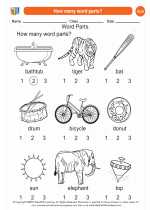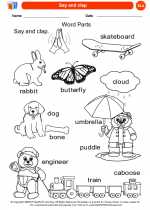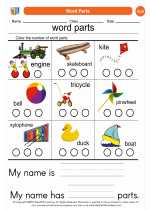Word Parts
Understanding word parts is an important aspect of early language arts development. Word parts include prefixes, suffixes, and root words. These elements can be combined to form new words and help students understand the meanings of unfamiliar words by breaking them down into smaller, more manageable parts.
Prefixes
A prefix is a group of letters added to the beginning of a word to change its meaning. For example, the prefix "un-" means "not" or "opposite", so adding "un-" to the word "happy" changes it to "unhappy", meaning "not happy".
Suffixes
A suffix is a group of letters added to the end of a word to change its meaning. For example, the suffix "-ful" means "full of", so adding "-ful" to the word "joy" changes it to "joyful", meaning "full of joy".
Root Words
A root word is a basic word with no prefix or suffix added to it. Many words in the English language are based on root words. For example, the root word "play" can be combined with the suffix "-er" to form "player".
Study Guide
- What is a prefix and how does it change the meaning of a word?
- Give an example of a word with a prefix and explain how the prefix changes the word's meaning.
- What is a suffix and how does it change the meaning of a word?
- Give an example of a word with a suffix and explain how the suffix changes the word's meaning.
- What is a root word and how is it used to form new words?
- Give an example of a word with a root word and explain how it can be combined with a prefix or suffix to form a new word.
Understanding word parts is an important skill for young learners as it helps them build their vocabulary and comprehend the meanings of various words they encounter in reading and writing activities.
[Word Parts] Related Worksheets and Study Guides:
.◂English Language Arts Worksheets and Study Guides Kindergarten. Word Parts

 Coloring Worksheet
Coloring Worksheet
 Worksheet/Answer key
Worksheet/Answer key
